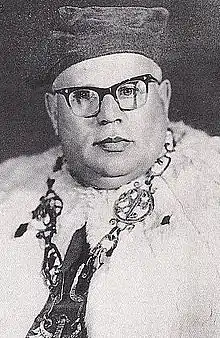Jerzy Słupecki
Jerzy Słupecki (1904–1987) was a Polish mathematician and logician.

Life
He attended the seminar of, and wrote a 1938 doctorate under, Jan Łukasiewicz.[1][2]
During WWII he was active in Żegota.[3]
In 1963, when at Wroclaw University, where he had been since 1945, he became editor of Studia Logica.[4][5]
Works
Słupecki showed how the many-valued logics of Łukasiewicz could be included in the theory of Post systems, and gave a functionally complete version of the three-valued logic.[6] In the logic of categorical sentences, he found a rule that made the theory decidable;[7] his work on Aristotle's logic, from 1948, was later reprinted in French.[8]
He also continued the work of Stanisław Leśniewski, and wrote on his system ("protothetics") in 1953, in Studia Logica.[9][10] A survey, "The Logical Works of Jerzy Slupecki", appeared in Studia Logica XLVIII (1989), by Jan Woleński and Jan Zygmunt.[11]
He published:
Notes
- Roman Murawski (27 August 2014). The Philosophy of Mathematics and Logic in the 1920s and 1930s in Poland. Springer. p. 63. ISBN 978-3-0348-0831-6.
- Andrew McFarland; Joanna McFarland; James Smith (11 August 2014). Alfred Tarski: Early Work in Poland—Geometry and Teaching. Springer. p. 198. ISBN 978-1-4939-1474-6.
- Woleński, Jan; Zygmunt, Jan (1989). "Jerzy Słupecki (1904-1987): Life and Work". Studia Logica. 48 (4): 401–411. doi:10.1007/BF00370196. ISSN 0039-3215. JSTOR 20015455. S2CID 35722973.
- Vincent F. Hendricks; Jacek Malinowski (9 March 2013). Trends in Logic: 50 Years of Studia Logica. Springer Science & Business Media. p. 23. ISBN 978-94-017-3598-8.
- Sandra Lapointe; Jan Wolenski; Mathieu Marion; Wioletta Miskiewicz (19 May 2009). The Golden Age of Polish Philosophy: Kazimierz Twardowski's Philosophical Legacy. Springer Science & Business Media. p. 9. ISBN 978-90-481-2401-5.
- Alonzo Church (1996). Introduction to Mathematical Logic. Princeton University Press. p. 162. ISBN 0-691-02906-7.
- Liliana Albertazzi (2004). Aristote au XIXe siècle (in French). Presses Univ. Septentrion. p. 403. ISBN 978-2-85939-864-4.
- Roger Pouivet; Manuel Rebuschi (2006). La philosophie en Pologne: 1918-1939 (in French). Vrin. p. 179. ISBN 978-2-7116-1824-8.
- Dov M. Gabbay; John Woods (16 June 2009). Logic from Russell to Church. Elsevier. p. 318. ISBN 978-0-08-088547-6.
- Alonzo Church (1996). Introduction to Mathematical Logic. Princeton University Press. p. 153. ISBN 0-691-02906-7.
- K. Mulligan; K. Kijania-PLacek; T. Placek; Katarzyna Kijania-Placek (26 January 2016). The History and Philosophy of Polish Logic: Essays in Honour of Jan Woleński. Palgrave Macmillan UK. ISBN 978-1-137-03089-4.
- Jan Łukasiewicz (1961). Z zagadnień logiki i filozofii: pisma wybrane. Państwowe Wydawn. Naukowe.
- Jerzy Słupecki; Ludwik Borkowski (1967). Elements of mathematical logic and set theory. Pergamon Press.